
At 14 years old, Detroit resident Stephen Hands decided that he and the region’s residents deserved better transit service. He convinced his mother, attorney Karen Kendrick-Hands, and father, environmental engineer Larry Hands, that the region needed a dedicated organization to move things forward. They started with informal gatherings at local coffee houses in 1999, and with a little helpful press coverage, the small group attracted a following. Through Karen’s de facto leadership, TRU developed a name, a mission, and a knack at getting in the doors of meetings often closed to advocates.
Within a couple of years, TRU incorporated and obtained its tax-exempt status as a 501c3 educational organization in 2001. The organization’s mission was simple: improve transportation access and mobility in Metro Detroit. Accomplishing the mission has been anything but simple, but the region has made great strides in 20 years. Our successes are thanks to our committed members, bold leaders, and critical funding.
Our Accomplishments
TRU has improved current bus service
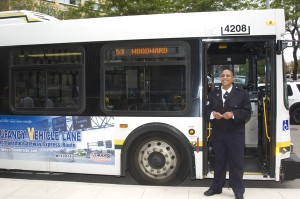 One of TRU’s core goals is to improve the quality of current transit service. TRU has worked closely with both Detroit area bus services, DDOT and SMART, pushing them to improve their service quality. Over the past few years, the two systems have started to work much more closely together, creating joint route maps, shared passes, and making it easier for riders to switch between services. Several times, we have dissuaded them against increasing fares and instead worked with them to optimize routes to best serve riders. Opportunities for public participation in DDOT decision-making have increased. Service for the disabled, a long time problem, is improving significantly. DDOT recently broke ground on a beautiful new bus terminal that will not only make transfers easier, but will attract new riders.
One of TRU’s core goals is to improve the quality of current transit service. TRU has worked closely with both Detroit area bus services, DDOT and SMART, pushing them to improve their service quality. Over the past few years, the two systems have started to work much more closely together, creating joint route maps, shared passes, and making it easier for riders to switch between services. Several times, we have dissuaded them against increasing fares and instead worked with them to optimize routes to best serve riders. Opportunities for public participation in DDOT decision-making have increased. Service for the disabled, a long time problem, is improving significantly. DDOT recently broke ground on a beautiful new bus terminal that will not only make transfers easier, but will attract new riders.
Ridership is up on both DDOT and SMART, a testament to the benefits of improved service. While SMART and DDOT officials may not always be excited to hear from TRU, because they know we will keep pushing them to do even better, they will acknowledge that TRU has played a key role in increasing riders’ voice and improving service.
TRU helped prevent harmful highway expansions
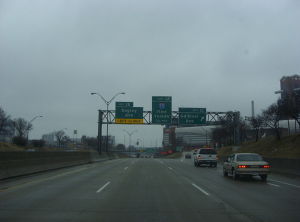 TRU has played a key role in the debate over expanding several of the Detroit areas highways, including I-94, I-75 and I-375. Government officials often push for expensive highway expansions as a short-term solution to traffic problems. However, adding lanes does very little to alleviate traffic and encourages more driving and sprawl. New space created by highway expansion is generally filled within 2-5 years.
TRU has played a key role in the debate over expanding several of the Detroit areas highways, including I-94, I-75 and I-375. Government officials often push for expensive highway expansions as a short-term solution to traffic problems. However, adding lanes does very little to alleviate traffic and encourages more driving and sprawl. New space created by highway expansion is generally filled within 2-5 years.
TRU has leveraged these evidence-based findings at various times in our reigon’s history as officials were poised to expand highways. We have filed extensive technical comments and actively participated throughout the process of considering highway expansion, pointing out the flaws in these plans and urging the consideration of rapid transit as an alternative. We’ve drawn media attention to the harms of highway expansion and got dozens of other organizations involved in opposing expansion. Due in part to TRU’s work, expansion of I-375 was cancelled and expansion of I-94 was dramatically scaled back. We are still working on I-75 and will continue to oppose any unnecessary and harmful highway expansion.
TRU is taking the difficult, careful steps toward quality regional transit
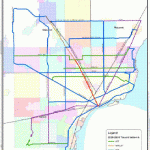 Ultimately, the Greater Detroit region needs a quality regional transit system including trains and buses, connecting the entire region quickly and conveniently, just like most major cities. This is not an easy task. TRU has stayed well-versed in best practices from other metros, researching the steps needed to achieve a regional rapid transit system. In addition to the pieces that are legally needed, including local and federal funding and a strong regional governing entity, public perception in this region must change to see transit as a real, viable alternative that is worth investing in. For the past five years, TRU has been taking the hard, slow steps needed to achieve this, including increasing public involvement in transportation issues, public education and the building of a broad regional supporting coalition.
Ultimately, the Greater Detroit region needs a quality regional transit system including trains and buses, connecting the entire region quickly and conveniently, just like most major cities. This is not an easy task. TRU has stayed well-versed in best practices from other metros, researching the steps needed to achieve a regional rapid transit system. In addition to the pieces that are legally needed, including local and federal funding and a strong regional governing entity, public perception in this region must change to see transit as a real, viable alternative that is worth investing in. For the past five years, TRU has been taking the hard, slow steps needed to achieve this, including increasing public involvement in transportation issues, public education and the building of a broad regional supporting coalition.
There are several exciting opportunities for regional rapid transit lines to be developed in the region, including the Ann Arbor to Detroit Rapid Transit project and a potential Woodward Avenue transit line. Both are in the process of studying alternatives. TRU has been actively involved in these projects, submitting comments, increasing public participation and watching the process carefully to prevent anything from preventing these critical first steps from occurring.
TRU has educated the public and local leaders
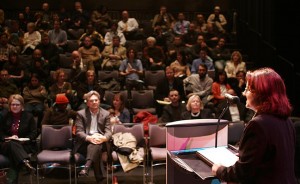 Educating the public about the benefits of and need for transit is critical to reaching our goals. TRU regularly attends community events, presents to organizations throughout the region, and is the go-to source for transit expertise for media in the region. Our quarterly newsletter and frequent email updates help thousands of people stay up-to-date on the latest developments and issues around transit.
Educating the public about the benefits of and need for transit is critical to reaching our goals. TRU regularly attends community events, presents to organizations throughout the region, and is the go-to source for transit expertise for media in the region. Our quarterly newsletter and frequent email updates help thousands of people stay up-to-date on the latest developments and issues around transit.
Generating enthusiasm and garnering regional participation in transit advocacy has been another priority. We’ve held three regional forums: “Moving from a Region in the Red to a Region in the Green” in 2002, “Transit on the Woodward Corridor, Our Economic Engine” in 2004, and “Detroit 2030: An Agenda for a Sustainable Metropolis” in 2005. In April, 2006 TRU hosted its “Desire Named Streetcar” event on the People Mover route to recognize both the end of streetcar service fifty years earlier and the benefits that new, modern rapid transit service can bring to Greater Detroit. These days, we regularly convene supporters through a variety of smaller events and our annual Regional Transit Awards banquet.
We have also worked to educate local community, business and political leaders about the benefits of transit. For the past two years we have held a “Ride the Bus Week,” getting dozens of leaders to experience public transit firsthand. One of those leaders, Oakland County Commissioner Mike Rogers, introduced and got passed a Board of Commissioners resolution in support of increased investment in public transit shortly after joining our event.
TRU has brought people together, creating diverse coalitions
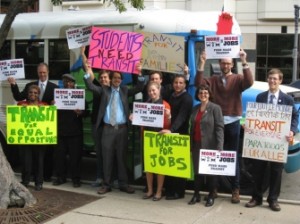 As an organization, TRU has brought together a very diverse group of people – city and suburban, black and white, young and old, necessity and choice bus riders, the disabled, business owners, elected officials – all people with a passion for improving transportation opportunities in this region.
As an organization, TRU has brought together a very diverse group of people – city and suburban, black and white, young and old, necessity and choice bus riders, the disabled, business owners, elected officials – all people with a passion for improving transportation opportunities in this region.
We work closely with other groups with the common goal of achieving quality transit, including MOSES, the Michigan Land Use Institute, the Michigan Environmental Council, Sierra Club, the Michigan Association of Railroad Passengers and the Michigan Suburbs Alliance, among others. We also strive to bring new diverse parties to the table and are proud to have worked with the Detroit Regional Chamber of Commerce , Southeast Michigan Sustainable Business Forum, the Woodward Avenue Action Association, and numerous individual businesses.
Achieving the quality transit system this region deserves will not be quick or easy. Transportation Riders United has a strong track record of doing the research, presenting the facts, involving the public, developing the coalitions, and educating the leaders needed to make it happen.
